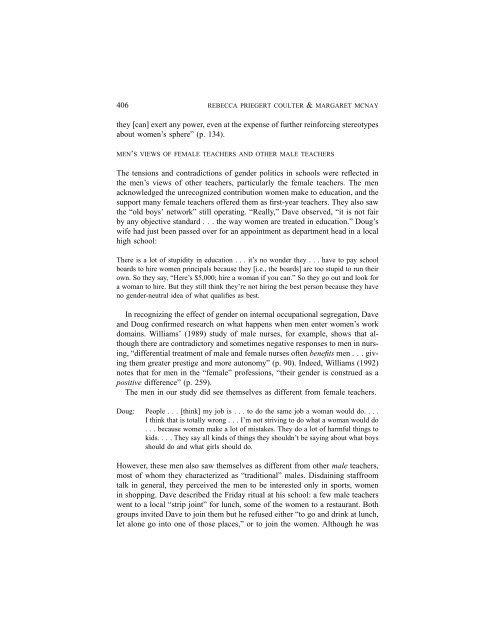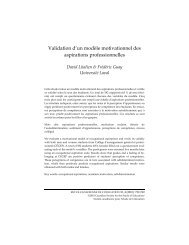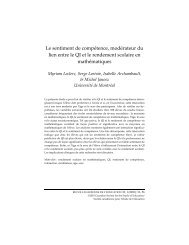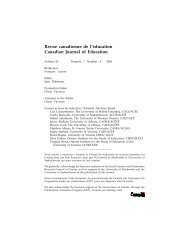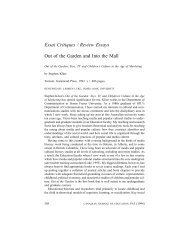Mireille Falardeau et Michel Loranger Le choix de stratégies ... - CSSE
Mireille Falardeau et Michel Loranger Le choix de stratégies ... - CSSE
Mireille Falardeau et Michel Loranger Le choix de stratégies ... - CSSE
You also want an ePaper? Increase the reach of your titles
YUMPU automatically turns print PDFs into web optimized ePapers that Google loves.
406 REBECCA PRIEGERT COULTER & MARGARET MCNAY<br />
they [can] exert any power, even at the expense of further reinforcing stereotypes<br />
about women’s sphere” (p. 134).<br />
MEN’S VIEWS OF FEMALE TEACHERS AND OTHER MALE TEACHERS<br />
The tensions and contradictions of gen<strong>de</strong>r politics in schools were reflected in<br />
the men’s views of other teachers, particularly the female teachers. The men<br />
acknowledged the unrecognized contribution women make to education, and the<br />
support many female teachers offered them as first-year teachers. They also saw<br />
the “old boys’ n<strong>et</strong>work” still operating. “Really,” Dave observed, “it is not fair<br />
by any objective standard . . . the way women are treated in education.” Doug’s<br />
wife had just been passed over for an appointment as <strong>de</strong>partment head in a local<br />
high school:<br />
There is a lot of stupidity in education . . . it’s no won<strong>de</strong>r they . . . have to pay school<br />
boards to hire women principals because they [i.e., the boards] are too stupid to run their<br />
own. So they say, “Here’s $5,000; hire a woman if you can.” So they go out and look for<br />
a woman to hire. But they still think they’re not hiring the best person because they have<br />
no gen<strong>de</strong>r-neutral i<strong>de</strong>a of what qualifies as best.<br />
In recognizing the effect of gen<strong>de</strong>r on internal occupational segregation, Dave<br />
and Doug confirmed research on what happens when men enter women’s work<br />
domains. Williams’ (1989) study of male nurses, for example, shows that although<br />
there are contradictory and som<strong>et</strong>imes negative responses to men in nursing,<br />
“differential treatment of male and female nurses often benefits men . . . giving<br />
them greater prestige and more autonomy” (p. 90). In<strong>de</strong>ed, Williams (1992)<br />
notes that for men in the “female” professions, “their gen<strong>de</strong>r is construed as a<br />
positive difference” (p. 259).<br />
The men in our study did see themselves as different from female teachers.<br />
Doug: People . . . [think] my job is . . . to do the same job a woman would do. ...<br />
I think that is totally wrong . . . I’m not striving to do what a woman would do<br />
. . . because women make a lot of mistakes. They do a lot of harmful things to<br />
kids. ...They say all kinds of things they shouldn’t be saying about what boys<br />
should do and what girls should do.<br />
However, these men also saw themselves as different from other male teachers,<br />
most of whom they characterized as “traditional” males. Disdaining staffroom<br />
talk in general, they perceived the men to be interested only in sports, women<br />
in shopping. Dave <strong>de</strong>scribed the Friday ritual at his school: a few male teachers<br />
went to a local “strip joint” for lunch, some of the women to a restaurant. Both<br />
groups invited Dave to join them but he refused either “to go and drink at lunch,<br />
l<strong>et</strong> alone go into one of those places,” or to join the women. Although he was


